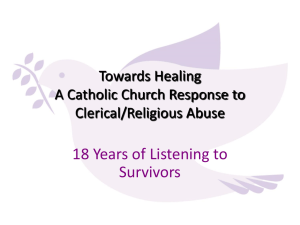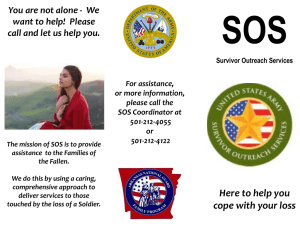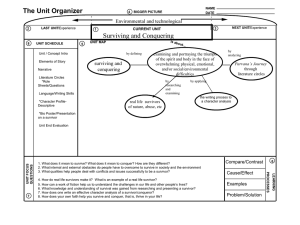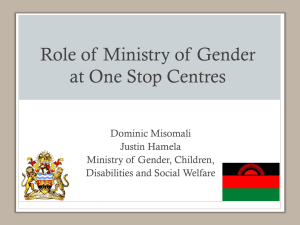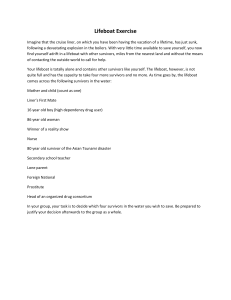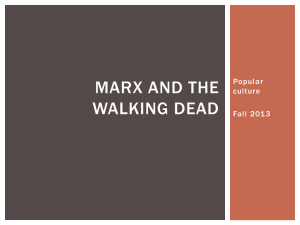guidance for former care and health providers
advertisement
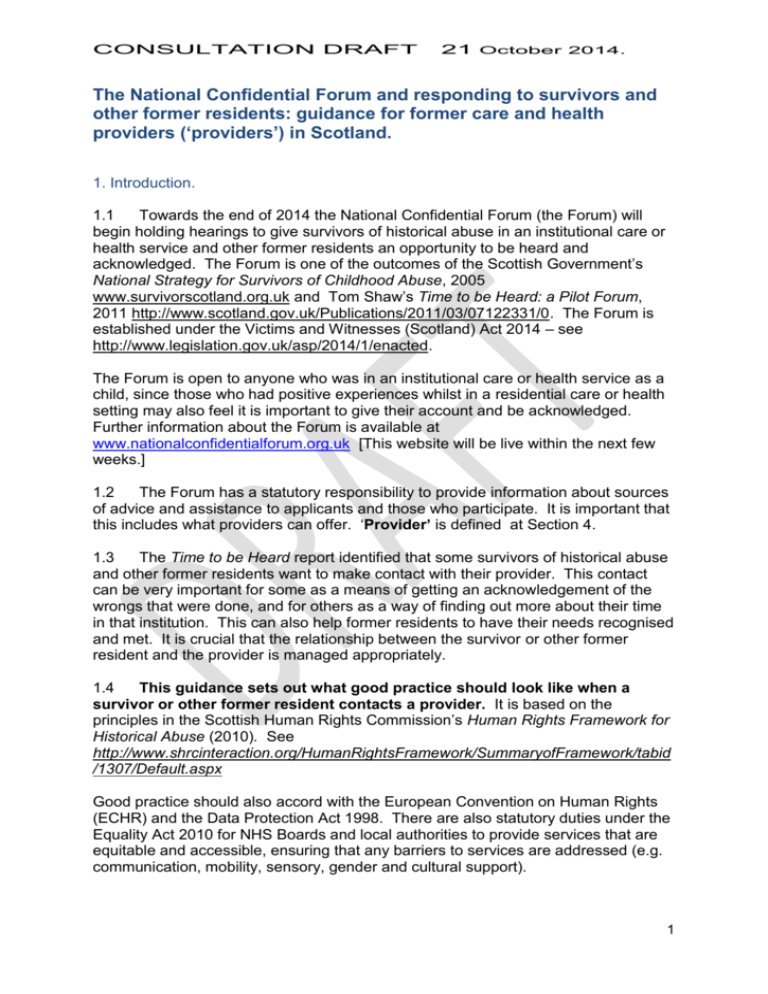
CONSULTATION DRAFT 21 October 2014. The National Confidential Forum and responding to survivors and other former residents: guidance for former care and health providers (‘providers’) in Scotland. 1. Introduction. 1.1 Towards the end of 2014 the National Confidential Forum (the Forum) will begin holding hearings to give survivors of historical abuse in an institutional care or health service and other former residents an opportunity to be heard and acknowledged. The Forum is one of the outcomes of the Scottish Government’s National Strategy for Survivors of Childhood Abuse, 2005 www.survivorscotland.org.uk and Tom Shaw’s Time to be Heard: a Pilot Forum, 2011 http://www.scotland.gov.uk/Publications/2011/03/07122331/0. The Forum is established under the Victims and Witnesses (Scotland) Act 2014 – see http://www.legislation.gov.uk/asp/2014/1/enacted. The Forum is open to anyone who was in an institutional care or health service as a child, since those who had positive experiences whilst in a residential care or health setting may also feel it is important to give their account and be acknowledged. Further information about the Forum is available at www.nationalconfidentialforum.org.uk [This website will be live within the next few weeks.] 1.2 The Forum has a statutory responsibility to provide information about sources of advice and assistance to applicants and those who participate. It is important that this includes what providers can offer. ‘Provider’ is defined at Section 4. 1.3 The Time to be Heard report identified that some survivors of historical abuse and other former residents want to make contact with their provider. This contact can be very important for some as a means of getting an acknowledgement of the wrongs that were done, and for others as a way of finding out more about their time in that institution. This can also help former residents to have their needs recognised and met. It is crucial that the relationship between the survivor or other former resident and the provider is managed appropriately. 1.4 This guidance sets out what good practice should look like when a survivor or other former resident contacts a provider. It is based on the principles in the Scottish Human Rights Commission’s Human Rights Framework for Historical Abuse (2010). See http://www.shrcinteraction.org/HumanRightsFramework/SummaryofFramework/tabid /1307/Default.aspx Good practice should also accord with the European Convention on Human Rights (ECHR) and the Data Protection Act 1998. There are also statutory duties under the Equality Act 2010 for NHS Boards and local authorities to provide services that are equitable and accessible, ensuring that any barriers to services are addressed (e.g. communication, mobility, sensory, gender and cultural support). 1 CONSULTATION DRAFT 21 October 2014. 1.5 The guidance has been drafted by the Good Practice Guidance Group, whose members have particular expertise in the provision of institutional care to children and in support to survivors of abuse in such care. Appendix 1 contains a list of the members. Members would like to acknowledge the advice and assistance offered by Aberlour, Action for Children, Barnardos, Children First and Quarriers and to thank them particularly for sharing of good practice materials (see Appendix 2 for examples.) 2. Who the guidance is for. 2.1 The guidance is designed for former and current providers, local authorities, the National Health Service and other agencies that placed children in care and health settings. Section 4 contains definitions of these terms. 2.2 The Forum will provide information to applicants and participants about what services providers can offer. Section 6 of this guidance contains some useful references to material produced by the Forum. 3. Purpose. 3.1 This guidance provides an opportunity for providers to show their corporate responsibilities for people who were formerly in their care. It also sets out the links between the Forum, as a key source of information for participants, and providers and purchasers, as the agencies that delivered or commissioned services. It aims to help providers and purchasers of institutional services to children in Scotland now and in the past to: Make clear what former residents can expect if they make contact with their provider. Give an appropriate, consistent and sensitive response to former residents who approach them. Offer practical and emotional support; it is not the role of the Forum to provide these outcomes. 4. Terminology. Survivor: this is the preferred term for adults, age 16 years and over, reporting that they were abused as children in care or health settings. This term covers ‘anyone who perceives themselves as having been abused’. Some survivors will also refer to themselves as victims or victim-survivors. Others may simply refer to themselves as former residents or care leavers. Provider: the care and health organisations that provided child care and/or placed children in care. 2 CONSULTATION DRAFT 21 October 2014. Social care and health care: for example, care in a residential home, children’s home, residential school, secure accommodation, long-stay hospital, boarding school, short breaks/respite service, residential clinic and 1940s evacuation camp. A health or care service can be publicly or privately owned. Further information on who is eligible to take part in the Forum is available at www.nationalconfidentialforum.org.uk . Historical abuse means abuse experienced by any adult when they were a child. It is not limited to sexual abuse. It includes neglect, emotional, physical, sexual, spiritual, psychological, ritual and financial abuse, which took place before the survivor was 16 years old; and which has been reported a significant time after the event. ‘Any adult’ includes people affected by learning disabilities, physical disabilities, dementia or mental health difficulties who were cared for as children in a care or health setting. The term historical abuse is a misnomer: for survivors, the effects of abuse are current, not past. Similarly, the offences may be ‘historical’, but reported criminality from the past needs to be investigated in the present, which makes such cases current. Reported abuse: this means abuse which has been reported to the police or other relevant authorities, or has ‘come to light’, and is distinct from ‘substantiated abuse’. Substantiated abuse: there are two levels of substantiated abuse where there has been: (1) a criminal conviction and the case is therefore proved ‘beyond reasonable doubt’; and (2) a successful civil action and the case is proved ‘on the balance of probabilities’. Perpetrator of historical abuse: this term refers not just to paid staff, volunteers or other people who had access to children in a care or health setting, but also to harm perpetrated by other children, under the age of 16 years, who were in the same care or health service. This is called peer-on-peer abuse. System abuse: where the workings of the child care system fail to meet the needs of children within it and prevent them from reaching their potential. 5. The Guidance: responding to survivors and other former residents. Please refer to the flowchart on page 10. Step 1: The Forum and linking with providers 5.1 The Forum is an opportunity for survivors and other former residents to be heard and acknowledged. For some, this will be all that they require. Others may be seeking access to a wide range of different services. The Forum has a statutory duty to signpost survivors and other former residents to advice and assistance. This includes advising survivors and other former residents about how to contact providers and explaining what they can expect from such contact . 3 CONSULTATION DRAFT 21 October 2014. Step 2 to 4: Making contact 5.2 A survivor or other former resident who expresses an interest in having contact with their provider, or the local authority social work or health service which made the placement or had ultimate responsibility, can do this in two ways. They can: Make direct contact themselves, but keep open the option of getting support from a third party at a later date. Use a third party, such as an independent advocate, a relative or a survivors’ organisation to make contact on their behalf. Organisations, such as In Care Survivor Service Scotland (ICSSS), can provide such a service and are listed in the Survivor Scotland directory of survivor support organisations and services which is available on the Forum website-see Section 6. 5.3 A former resident, or their representative, can contact their provider by phone, email or letter. This is the first point of contact. It is essential that the inquirer receives an appropriate and sensitive response at this initial stage because this will determine whether their experience is going to be a positive one for themselves and the provider. It is recognised that such contact can sometimes be uncomfortable and could be perceived as threatening for providers’ staff. Appendix 2 contains examples about how such initial contact can be managed sensitively and positively by staff. 5.4 The provider, and/or the local authority or health board which made the placement, should have an identified person as the first point of contact. This lead person should be identified by their post/title, rather than by their name (because of staff turnover). They should be experienced or trained in this area of work so that they are able to respond appropriately to the particular needs of survivors and other former residents. Their role is to be the one person who facilitates all further contact between the provider and the Forum applicant/participant. They are also responsible for ensuring that good progress is made in dealing with any request from the applicant/participant. It is essential that the survivor or other former resident is not passed from one person, department or section to another. 5.5 Meeting with a representative of the provider, or the local authority or health board that made the placement, can provide an effective opportunity for the person to be heard and acknowledged. This discussion can also help the survivor or other former resident to determine what further support or assistance they require. Providers need to consider how, when and where such face-to-face meetings are arranged. The impact on and support needs of the survivor or other former resident before, during and after contact with the provider should be considered. 5.6 For survivors and other former residents who are living outwith Scotland or the UK, this contact is likely to be by letter, telephone, email, SKYPE or similar. 4 CONSULTATION DRAFT 21 October 2014. 5.7 Survivors’ and other former residents’ needs change with time. A particular need may not be established now but in months/years/decades. Survivors and other former residents may return to speak again with a representative from the provider. Providers should be prepared for this and keep confidential records, in accordance with the Public Records (Scotland) Act 2011, to ensure that the person does not have to give another detailed account of their personal history. 5.8 In preparation for contact with survivors and other former residents, providers should consult with their legal and insurance advisers to ensure they are aware of potential insurance or legal liabilities. Often this will mean consulting with previous, and not just current, insurance providers. This will enable providers to respond in good time and with an understanding of potential issues and resource implications. Steps 5 and 6: Meeting the person’s needs How providers should respond 5.9 Providers should meet their corporate responsibilities toward survivors. To set the context a useful starting point can be found in The Time To Be Heard report Recommendations for Service Providers (section 4.2.1, pages 106–108) http://www.scotland.gov.uk/Publications/2011/03/07122331/0 Survivors and other former residents may approach providers via the National Confidential Forum or directly on their own initiative. The National Guidance for Child Protection in Scotland, May 2014, paragraphs 585–596, provides additional guidance about managing reports of historical abuse. http://www.scotland.gov.uk/Publications/2014/05/3052 The needs and wishes of survivors and other former residents 5.10 A meeting or contact between a survivor or other former resident and the provider will be an opportunity to hear about the individual’s needs and what they may want to do next. It is the first step in reaching out to acknowledge and help them. 5.11 Such meetings should start with establishing a ‘safe’ environment – trust and confidence – for discussion. It may be helpful at the start of the meeting to establish the needs and wishes of the person. Confidentiality and its limits (see sections 5.23 and 5.24) should form part of this initial discussion. Keep all communication in plain English. Section 5.16 refers to redaction of records. Concern for the wellbeing of others 5.12 Survivors and other former residents may seek reassurance that current child protection policy and procedures are robust and adhered to. The arrangements for the Forum should ensure that any alleged perpetrator who may be a current danger 5 CONSULTATION DRAFT 21 October 2014. to children will be reported to the police. You can read more about these arrangements on the Forum website- and see Section 6. Investigation 5.13 The Forum will facilitate reporting to the police. The survivor may already have referred the matter to the police or may only wish to do so after meeting with the provider. 5.14 Whether or not a report of a potentially criminal matter (made by a survivor to a provider) must be reported to Police Scotland is determined by the particular circumstances in each case. If the alleged perpetrator is employed or is volunteering in a position of trust with children or vulnerable adults, there is a legal obligation on the provider to report the allegation. If this is not the case, a report may still be made, but it is not mandatory, and the survivor should remain in control of this decision. The survivor or other former resident, or the provider, can report suspected criminality to Police Scotland at any time. Some survivors may want a formal investigation by the provider to establish what happened (the facts) and why, to improve present child care or child health practice and reduce the likelihood of something similar happening again. This may be in addition to, or instead of, a police investigation. Access to records 5.15 Inquirers should be able to see, and under the Data Protection Act, 1998, have legible copies of, written or electronic records about their time in a care or health service. This includes reports, letters, emails, typed and handwritten records, notes and photographs. The relatives of deceased former survivors may also request such information. 5.16 The Time to be Heard report gives recommendations about record keeping (recommendation 14, page 112,). Where records have been redacted the reasons for this should be shared with the survivor , where possible. Current guidance is now available, following implementation of the Records (Scotland) Act 2011, at http://www.nationalarchives.gov.uk/documents/informationmanagement/redaction_toolkit.pdf 5.17 The need for skilled assistance with this sensitive process has already been highlighted. It is required because sometimes a survivor or other former resident can be shocked and re-traumatised by what they read in their records. Their expectations of what they will find in the records can vary dramatically from what is actually there. 5.18 Survivors and other former residents may want to go back to view the building where they lived (not just once but from time-to-time). The Time to be Heard report encourages service providers to help former residents to feel that they are ‘…going home’ and make them feel warmly welcomed and valued and feel that they are there 6 CONSULTATION DRAFT 21 October 2014. as a right’ (section 4.2.1, page 106). This will enhance the experience for the former resident. See Appendix 2 for examples of providers’ guidance on these topics. Signposting to specialist voluntary organisations 5.19 At some point in a provider’s contact with a survivor or other former resident, the survivor/other former resident may express an interest in finding out about support from specialist organisations for survivors and other former residents. Often survivors and other former residents will already have been in contact with, or be aware of, such organisations. See Section 6 for links to the Survivor Scotland directory of specialist organisations for survivors and other former residents. Independent professional counselling 5.20 Counselling may be useful for some survivors, although this is a personal choice. Survivors may need help to find agencies that offer appropriate counselling and support. This includes NHS trauma services. See the Survivor Scotland directory of survivor support organisations and services at www.nationalconfidentialforum.org.uk and at Section 6 of this guidance. Other services and needs 5.21 Support may be needed for the survivors’ and other former residents’ ‘supportive family’ members, spouses, partners, etc., who have been indirectly affected by the experience of their family member in a care or health service. These needs may be met through health, care and voluntary organisations. 5.22 Other responses are being explored through the InterAction process- e.g. reparation, apology, a national inquiry and acknowledgement. (See Section 6 for more information. ) Future versions of this guidance will cover any developments in relation to these topics. Protecting survivors and other former residents and others: sharing information with Police Scotland 5.23 The limits to confidentiality need to be discussed with the survivor when they first make contact with the provider or the third-party agency. It is a requirement of the legislation establishing the Forum for the Forum to share information with Police Scotland so as to prevent an offence of abuse against a child. It is likely that this will also be standard practice to prevent harm to a vulnerable adult. Similarly a survivor who has approached a provider directly, and not via the Forum, may disclose such information and the same response is appropriate. See Appendix 1 for examples of providers’ historical abuse procedures that address these issues. 5.24 Information should be shared with the knowledge and ideally the consent of the person who provides the information. If they do not consent to the sharing of 7 CONSULTATION DRAFT 21 October 2014. such information, the survivor can choose whether they want to cooperate with any police enquiries. Such information sharing can indirectly help other survivors and other former residents who have also made a complaint to the police, or who may do so in the future. Complaints and feedback procedure 5.25 If a survivor or former resident is not satisfied with the response they have received from the provider, they should have access to the standard complaints procedure. This will ensure that their feedback is received and acted upon. Best practice guidance about complaints and feedback procedures can be found at http://www.spso.org.uk/leaflets-and-guidance . Providers should consider collating feedback from survivors to enable them to report outcomes more effectively. Long-term 5.26 Many survivors’ needs change with time, life events and circumstances – permanent provision needs to be made for meeting these needs. Providers and support services should be prepared for renewed contact by survivors and other former residents after years/decades have elapsed since the initial contact. 5.27 These guidelines should assist organisations to enhance current and future practice, acting on feedback from survivors and other former residents. The aim is to ensure that ‘lessons are learnt’ and that they help to shape current and future child care or child heatlh practice. 6. Key references. (References will be in reading-order in final draft.) 1. Tom Shaw, Historical Abuse Systemic Review, Residential Schools and Children’s Homes in Scotland 1950-1995, 2011. http://www.scotland.gov.uk/Publications/2007/11/20104729/0 2. Tom Shaw, Time to be Heard: a Pilot Forum, 2011. An independent report commissioned by the Scottish Government. http://www.scotland.gov.uk/Publications/2011/03/07122331/0 3. Moyra Hawthorn, Historic Abuse in Residential Care: Sharing Good Practice, 2006 (SIRCC) http://www.celcis.org/resources/entry/in_residence_2011 4. Survivor Scotland, a National Strategy for Survivors of Childhood Abuse. www.survivorscotland.org.uk 5. In Care Survivors Services Scotland, a partnership led by Open Secret. www.incaresurvivors.org.uk 8 CONSULTATION DRAFT 21 October 2014. 6. Historic child abuse in Scotland - the InterAction. The Scottish Human Rights Commission is using an InterAction process to allow those affected by historic child abuse, survivors and other former residents, institutions, government, civil society and others, a platform, to give their views on how the Human Rights Framework should be implemented. http://www.shrcinteraction.org/ 7. Scottish Human Rights Commission’s Human Rights Framework for Historical Abuse (2010). http://www.shrcinteraction.org/HumanRightsFramework/SummaryofFramework/tabid /1307/Default.aspx 8. National Guidance for Child Protection in Scotland, revised edition, May 2014. See paragraphs 585–596 for guidance about managing reports of historical abuse. http://www.scotland.gov.uk/Resource/0045/00450733.pdf 9. National Confidential Forum: Directory of Advice and Assistance for applicants to and participants in the Forum [link to be inserted] 10. National Confidential Forum Information Pack [link to be inserted] 11. National Confidential Forum Protocol for sharing information with Police Scotland [link to be inserted] 9 CONSULTATION DRAFT 21 October 2014. National Confidential Forum links with providers: responding to survivors and former residents 1. National Confidential Forum: listening and acknowledging. Being heard and acknowledged through the National Confidential Forum will be a sufficient outcome for most people. Some may make contact with survivor organisations, or other support services. No further action needed. 2. The person wants to contact their provider or the local authority social work service that made the placement. This could happen at any time, not just shortly after going to the National Confidential Forum. The survivor or former resident may also contact the provider without using the National Confidential Forum. 3. The person has choices: make direct contact themselves, or via an advocate or a representative from a support organisation. National Confidential Forum puts the person in contact with a support/third-party organisation. 4. Person or representative: by phone, email, or letter, contact with the provider’s or local authority’s named-post contact person. 5. MEETING THE NEEDS OF THE PERSON: the provider will need to have a process, and possibly funding, for helping the person to establish, and then meet, their needs. Outcomes could include the following. ‘Sign posting’ to specialist voluntary organisations for survivors. Access to records. Other services or actions: e.g. support for survivor’s ‘supportive’ family members, spouse, partner etc. affected by the abuse. Independent professional counselling. Investigation by the police and subsequently by the provider if appropriate. If person, or others, are at risk of significant harm: action to ensure that they are protected from the same perpetrator(s). Scottish Human Rights Commission: to report in the future about apology, reparation and restorative justice outcomes. 6. POSSIBLE OUTCOMES Meeting with representatives of the provider or local authority: further opportunity to be heard and acknowledged. Access to feedback procedure for people who are not satisfied with the outcome of their contact with providers. People’s needs change over time: providers should be prepared for further contact. 10 CONSULTATION DRAFT 21 October 2014. Appendices. Appendix 1 Members of the Good Practice Guidance Working Group and the organisations that they represent Richard Crosse, Head of Safeguarding, Church of Scotland (Convenor) Safia Ali, Project Manager (from July 2014) Cath Taylor (April to July 2014) Lorna Paterson (to April 2014) In-Care Survivors Service Scotland Tina Campbell, National Coordinator for Safeguarding, Catholic Church in Scotland Paul Gilroy, Head of Service CrossReach Children and Families, Education through Care Scotland (EtCS) Moyra Hawthorn, Researcher, Residential Childcare Worker, Centre for Excellence for Looked After Children in Scotland Michelle Miller, Chief Social Work Officer, City of Edinburgh Council, Social Work Scotland; Society of Local Authority Chief Executives David Whelan, Former resident, NCF Selection Panel and Interaction Review group member, Former Boys and Girls Abused of Quarriers Homes Secretariat Elizabeth Gourlay, SurvivorScotland Team, Care Support and Rights Division, Scottish Government Sue Moody, SurvivorScotland Team, Care Support and Rights Division, Scottish Government 11 CONSULTATION DRAFT 21 October 2014. Appendix 2. Examples of providers’ access to records and associated historical abuse policy and procedures The following organisations have kindly agreed to share their documents that are available to view and download at [web location to be determined; insert web link] Barnardos Making Connections Service, Historical Abuse Procedure, October 2009. Action for Children, Access to Personal Information Standards (undated). Quarriers, Access to Historic Records Standards, April 2006. 12
